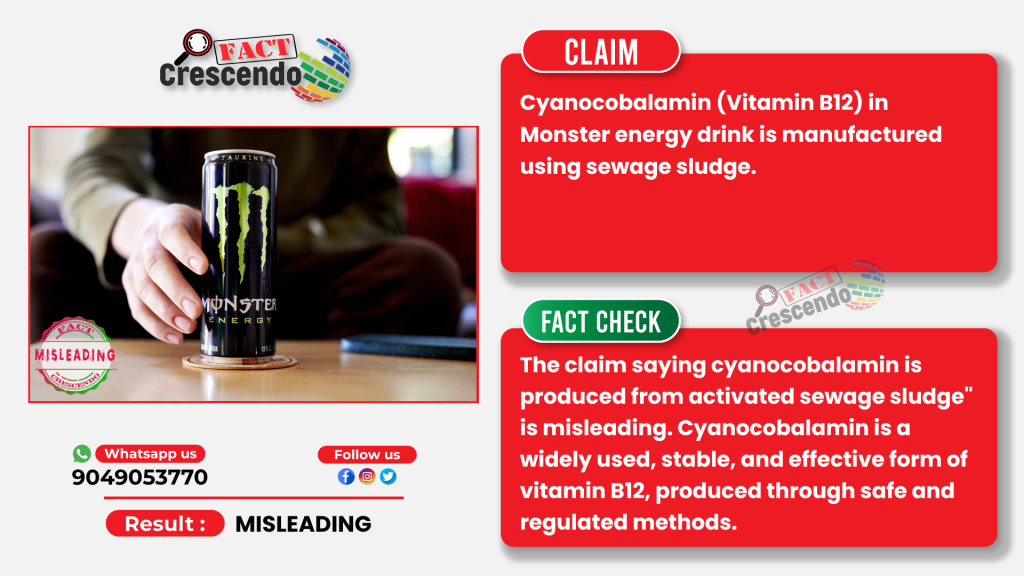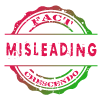
On social media, people often discuss foods, beverages, and their qualities, as well as the health impacts of consuming them. However, these discussions sometimes include misleading claims, spreading misinformation about nutrition and health. This can lead to confusion and misconceptions, making it important for individuals to critically evaluate the information they encounter and rely on credible sources for accurate dietary advice.
Social Media Posts
A social media post is circulating that claims energy drinks such as Monster and C-4 contain cyanocobalamin, a form of vitamin B12, which is allegedly made from “sewage foam” or “activated sewage sludge.”
We decided to do a fact check on this.
Fact Check
Cyanocobalamin, a synthetic form of vitamin B12, is commonly included in energy drinks like Monster Energy. Despite concerns raised by some pseudo-experts, cyanocobalamin is generally recognized as safe by health authorities when consumed in typical amounts found in these beverages.
Cyanocobalamin: The Powerhouse Vitamin B12
Cyanocobalamin, more commonly known as vitamin B12, is a vital nutrient that plays a critical role in many bodily functions. Cyanocobalamin is a synthetic form of Vitamin B12 which the body converts into Adenosylcobalamin and Methylcobalamin before it can be used. More details can be read here
The most common and cost-effective form of Vitamin B12, Cyanocobalamin is most often found in supplements and some fortified foods. It’s a complex molecule with a cobalt atom at its center, surrounded by a ring-like structure. This unique structure is essential for its activity.
Source : National Library of Medicine ,US
Cyanocobalamin is also used for medicinal purposes to treat and prevent Vitamin B12 deficiency anemia by creating red blood cells. These medicines are also available at pharmacies which can be bought with a doctor’s prescription.
Vitamin B12 is crucial for healthy nerve function, red blood cell production, and DNA synthesis. It helps maintain the myelin sheath, a fatty layer that insulates nerves, and aids in the conversion of food into energy. A deficiency can lead to a variety of health problems, including fatigue, weakness, anemia, nerve damage, and even dementia.
Our bodies can’t produce B12 on their own, so we must obtain it from our diet. Animal products like meat, poultry, fish, eggs, and dairy are the richest natural sources. However, strict vegetarians and vegans may struggle to get enough B12, as plant-based sources are limited and often poorly absorbed. In these cases, B12 supplements are recommended.More details can be read here
Production of Cyanocobalamin
- Commercially, cyanocobalamin is not typically extracted from food sources. Instead, it’s produced through microbial fermentation. Here’s a simplified version of the process:
- Preparation: A specific strain of bacteria, like Pseudomonas denitrificans, is grown in a large tank containing a carefully controlled medium rich in nutrients like cobalt, sugar, and other essential elements.
- Fermentation: The bacteria naturally synthesize B12 during their growth cycle.
- Downstream Processing: After fermentation, the B12 is extracted and purified from the bacterial culture using multiple steps like filtration, precipitation, and chromatography.
- Crystallization: The purified B12 is then crystallized to form a stable and concentrated product.
This microbial fermentation method allows for large-scale production of B12 for use in supplements and food fortification.More details can be read here
Claim 1: Cyanocobalamin is a fancy name for sewage foam
Facts
Cyanocobalamin is a synthetic form of vitamin B12. It is commonly used in dietary supplements and fortified foods because it is stable and cost-effective. It is not derived from sewage foam. The production of cyanocobalamin involves chemical synthesis or bacterial fermentation, both of which are standard and safe practices in the pharmaceutical and food industries. A U.S. patent from 1953 protects the process of preparing B12 from sewage sludge.The patent can be reached here
Claim 2: Cyanocobalamin is found in a wide range of vitamins and foods as a synthetic additive
Facts
While it is true that cyanocobalamin is a synthetic form of vitamin B12 and is widely used in vitamins and fortified foods, calling it an “additive” with a negative connotation is misleading. Vitamin B12 is essential for human health, playing a critical role in nerve function and the production of DNA and red blood cells. The synthetic form is used because it is stable and effective in preventing B12 deficiency.
Claim 3: This form of B12 is used because it is cheap
Facts
Cyanocobalamin is used in many supplements and fortified foods partly because it is cost-effective. However, its use is also due to its stability and bioavailability. Other forms of vitamin B12, such as methylcobalamin and adenosylcobalamin, are also used in supplements, but cyanocobalamin remains popular due to these additional factors.
Claim 4: Cyanocobalamin is made from mammalian tissue or recovered from activated sewage sludge
Facts
This claim is incorrect. Cyanocobalamin is produced via chemical synthesis or through bacterial fermentation. The reference to “activated sewage sludge” appears to be a gross misrepresentation. While some processes in the past might have used certain by-products for fermentation, modern production of cyanocobalamin is highly regulated and does not involve sewage sludge.
Recently, engineers have shifted their attention to Escherichia coli as a platform for vitamin B12 production. A detailed process of production of cyanocobalamin can be read here
Inclusion of Cyanide in Cyanocobalamin Molecule
Dr. Walter Willett, a professor of epidemiology and nutrition at Harvard’s School of Public Health, stated in an email to USA TODAY that while it is true that most B12 supplements contain cyanide as a component, the quantity is extremely low and not toxic to humans.
“Many healthy foods, like spinach and almonds, naturally contain small amounts of cyanide,” Willett noted. “Although cyanide is harmful in large quantities, the levels used in vitamin supplements are not dangerous.”
ConsumerLabs.com reported that cyanocobalamin, the synthetic form of B12 commonly found in supplements, includes a cyanide molecule but remains safe for consumption. USA Today report can be read here
FDA Recommendations and Safety Standards
The U.S. Food and Drug Administration (FDA) regulates dietary supplements and food additives to ensure they are safe for consumption. Cyanocobalamin, as a form of vitamin B12, is considered safe and effective. The FDA sets guidelines on the manufacturing processes and quality control for all vitamins and supplements sold in the U.S.The report can be reached here
Key Points:
The FDA monitors and regulates the production of dietary supplements, ensuring they meet strict safety and efficacy standards.
Vitamin B12 supplements, including those containing cyanocobalamin, must adhere to these regulations, guaranteeing they are free from harmful contaminants and produced under sanitary conditions.
The FDA has approved cyanocobalamin for use in fortified foods and dietary supplements due to its stability and effectiveness in preventing B12 deficiency.
Conclusion
The claims made in the social media post regarding cyanocobalamin and its association with “sewage foam” or “activated sewage sludge” are unfounded and misleading. Cyanocobalamin is a widely used, stable, and effective form of vitamin B12, produced through safe and regulated methods. The FDA ensures that all dietary supplements and food additives, including cyanocobalamin, meet rigorous safety and quality standards.

Title:Cyanocobalamin in Monster Energy Drinks Is manufactured from sewage sludge? True, False or What Else?
Fact Check By: Fact Crescendo TeamResult: Misleading


